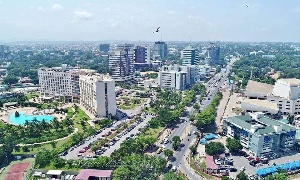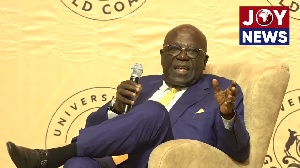Business News of Monday, 26 May 2025
Source: www.ghanawebbers.com
Consumer, business confidence hit 7-year
At the end of the 124th Monetary Policy Committee (MPC) meeting, Bank of Ghana Governor Dr. Johnson Pandit Asiama announced key economic updates.
The composite index of economic activity rose by 2.3 percent year-on-year in March 2025. This growth is more than double last year's rate. Improvements in new orders and production volumes pushed the index above the neutral benchmark of 50, indicating expansion in key sectors.
Headline inflation dropped to 21.2 percent in April, down from 23.8 percent in January. The decline was driven by lower food and non-food prices. This helped improve economic sentiment and supported a narrative of recovery.
Dr. Asiama noted that confidence surveys showed significant improvement due to easing inflationary pressures. “These are the highest levels recorded since 2018,” he stated.
The cedi has shown strong performance recently, appreciating by 24.1 percent against the U.S. dollar this year. It gained 16.2 percent against the pound and 14.1 percent against the euro as well. This appreciation is supported by tighter monetary policy and record international reserves.
As of April 2025, gross international reserves reached US$10.7 billion, covering 4.7 months of imports. This marks a recovery from the levels seen during the 2022 balance of payments crisis.
A US$2.1 billion current account surplus in Q1 2025 contributed to this reserve buildup, driven by rising gold and copper exports along with resilient remittance flows.
“The external sector outlook remains favorable,” said Dr. Asiama, citing expectations for sustained commodity exports and remittance inflows as stabilizing factors for reserves.
On fiscal matters, the government adhered closely to its budget framework for 2025 despite underperforming revenue in Q1. Expenditure rationalization measures helped contain the fiscal gap effectively.
Provisional data indicated an improved primary fiscal balance on a commitment basis, boosting investor confidence in Ghana’s fiscal trajectory.
Public debt also showed signs of moderation; it stood at GH¢769.4 billion or 55 percent of GDP by March's end—down from December's figure of 61.8 percent.
Analysts view this drop as a result of ongoing fiscal consolidation and exchange rate gains.
An unnamed economist based in Accra commented on these developments: “What we are seeing now is a virtuous cycle.” A stable currency eases inflation, which boosts business sentiment and supports growth.
Despite these positive trends, the Bank of Ghana decided to keep its benchmark policy rate at 28 percent unanimously during the MPC meeting.
While acknowledging progress on inflation moderation, committee members noted that inflation remains high relative to medium-term targets necessitating continued tight policies.











